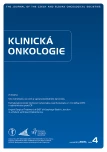Proposed Strategies for Improving Adherence to Tyrosine Kinase Inhibitors in Patients with Chronic Myeloid Leukaemia
Published in:
Klin Onkol 2019; 32(4): 313
Category:
Letter to Editor
Dear Editor,
Tyrosine kinase inhibitors (TKI) are the drug of first choice for patients with chronic myeloid leukaemia (CML) [1]. However, for achieving complete molecular response, the patient’s adherence to a daily regimen in the prescribed dosage, time and duration is critical [2]. Previous studies have showed that patients’ adherence to long-term therapy with TKIs is suboptimal [3]. It is estimated that 30–47% of patients with CML receiving TKIs did not adhere completely to the therapeutic regimen and only 15% of them were 100% adherent [2,4]. Poor adherence to TKIs can delay the achievement of optimal therapeutic goals and the clinical response in patients with CML and this can compromise event-free survival [5,6]. By contrast, evidence suggests that good adherence to TKIs improves patient-related clinical outcomes [7].
Although extensive efforts have been made to resolve the problem of non-adherence in these patients thus far, the overall prevalence of non-adherence is still high. Factors affecting adherence to medication among patients with CML are multifaceted and can be categorised as patient-, social-, disease-, treatment-, and healthcare-related factors [8]. Among these, patient-related factors are more complex and tailoring adherence interventions to those factors is difficult [6,9]. TKI-related side effects, poor understanding on the part of the patients about the risks of the disease, forgetfulness, insufficient patient education, long duration of treatment and importantly, intentional drug withdrawal are common factors associated with patients’ non-adherence [2,7,9].
On the other hand, one of the important responsibilities of clinicians, particularly nurses, is educating patients about the regular use of prescribed medications. Given the high prevalence of non-adherence, the question that arises is how nurses can play a greater role in improving CML patients’ adherence to TKIs. In this context, the first essential step could be comprehensively identifying and characterising the factors affecting patients’ adherence to TKIs. The life experiences of patients, possible barriers to drug discontinuation as well as facilitators of adherence to medication need to be explored and explained from the perspective of the patient and his or her family. This step requires well-designed quantitative and qualitative researches. The recognition of non-adherence factors can form the basis for designing adherence promotion interventions in order to eliminate or modify these factors. Given that patient-related factors play a dominant role in non-adherence, patients and their family members should be well-informed about the need for regular drug taking and the recurring nature of CML. In addition, the necessity of accurate intake of TKIs in the prescribed dose and specified duration should be emphasised routinely. The patients should be informed that irregular drug use reduces the effectiveness of the treatment and increases the risk of disease recurrence. Moreover, smartphones, negative reinforcement interventions, close monitoring, dosage modification, simplified dosing plans, engaging patients’ families, conducting periodic screening and direct communication with the patient may be used to improve patient adherence. Nurses can play a dominant role in these parts. Therefore, future prospective larger-scale studies need to be conducted to address the individual, social and environmental factors affecting adherence to these drugs. Afterward, tailored interventions should be designed to modify or eliminate those factors.
Mohammad Ali Heidari Gorji, PhD
Department of Medical-Surgical Nursing,
Nasibeh Faculty of Nursing and Midwifery,
Mazandaran University of Medical Sciences,
Sari, Iran
e-mail: drheidarigorji@yahoo.com
Sources
1. Koca E, Haznedaroðlu ÝC. Imatinib mesylate and the management of chronic myeloid leukemia (CML). Turk J Hematol 2005; 22 (4): 161–172.
2. Rychter A, Jerzmanowski P, Hołub A et al. Treatment adherence in chronic myeloid leukaemia patients receiving tyrosine kinase inhibitors. Med Oncol 2017; 34 (6): 104. doi: 10.1007/s12032-017-0958-6.
3. Alrabiah Z, Alhossan A, Yun S et al. Adherence to tyrosine kinase inhibitor therapy in patients with chronic myeloid leukemia: meta-analyses of prevalence rates by measurement method. Blood 2016; 128 (22): 3610.
4. Al-Dewik NI, Morsi HM, Samara MM et al. Is adherence to imatinib mesylate treatment among patients with chronic myeloid leukemia associated with better clinical outcomes in Qatar? Clin Med Insights Oncol 2016; 10 : 95–104. doi: 10.4137/CMO.S32822.
5. Ganesan P, Sagar TG, Dubashi B et al. Nonadherence to imatinib adversely affects event free survival in chronic phase chronic myeloid leukemia. Am J Hematol 2011; 86 (6): 471–474. doi: 10.1002/ajh.22019.
6. Ibrahim AR, Eliasson L, Apperley JF et al. Poor adherence is the main reason for loss of CCyR and imatinib failure for chronic myeloid leukemia patients on long-term the-rapy. Blood 2011; 117 (14): 3733–3736. doi: 10.1182/blood-2010-10-309807.
7. Marin D, Bazeos A, Mahon FX et al. Adherence is the critical factor for achieving molecular responses in patients with chronic myeloid leukemia who achieve complete cytogenetic responses on imatinib. J Clin Oncol 2010; 28 (14): 2381–2388. doi: 10.1200/JCO.2009.26.3087.
8. Hall AE, Paul C, Bryant J et al. To adhere or not to adhere: rates and reasons of medication adherence in hematological cancer patients. Crit Rev Oncol Hematol 2016; 97 : 247–262. doi: 10.1016/j.critrevonc.2015.08.025.
9. Al-Barrak J, Cheung WY. Adherence to imatinib therapy in gastrointestinal stromal tumors and chronic myeloid leukemia. Support Care Cancer 2013; 21 (8): 2351–2357. doi: 10.1007/s00520-013-1831-6.
Labels
Paediatric clinical oncology Surgery Clinical oncologyArticle was published in
Clinical Oncology

2019 Issue 4
- Metamizole vs. Tramadol in Postoperative Analgesia
- Safety and Tolerance of Metamizole in Postoperative Analgesia in Children
- Metamizole in perioperative treatment in children under 14 years – results of a questionnaire survey from practice
- Obstacle Called Vasospasm: Which Solution Is Most Effective in Microsurgery and How to Pharmacologically Assist It?
- Possibilities of Using Metamizole in the Treatment of Acute Primary Headaches
Most read in this issue
- Role of the Microbiome in the Formation and Development of Colorectal Cancer
- Current Perspective on HPV-Associated Oropharyngeal Carcinomas and the Role of p16 as a Surrogate Marker of High-Risk HPV
- Oncology Case Report – When Is the Appropriate Time to Integrate Palliative Care?
- Incidence and Risk Factors of Distant Metastases of Head and Neck Carcinoma
